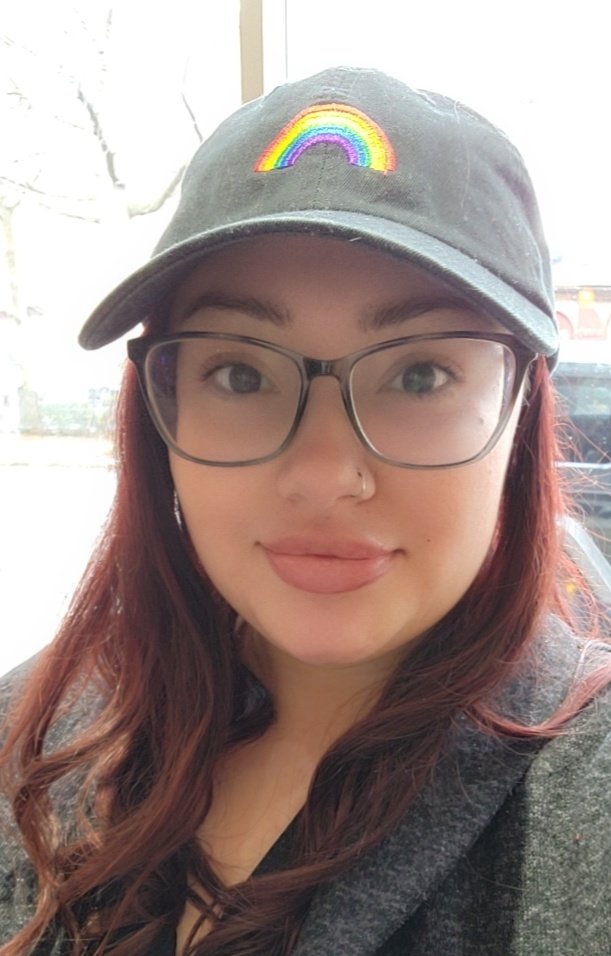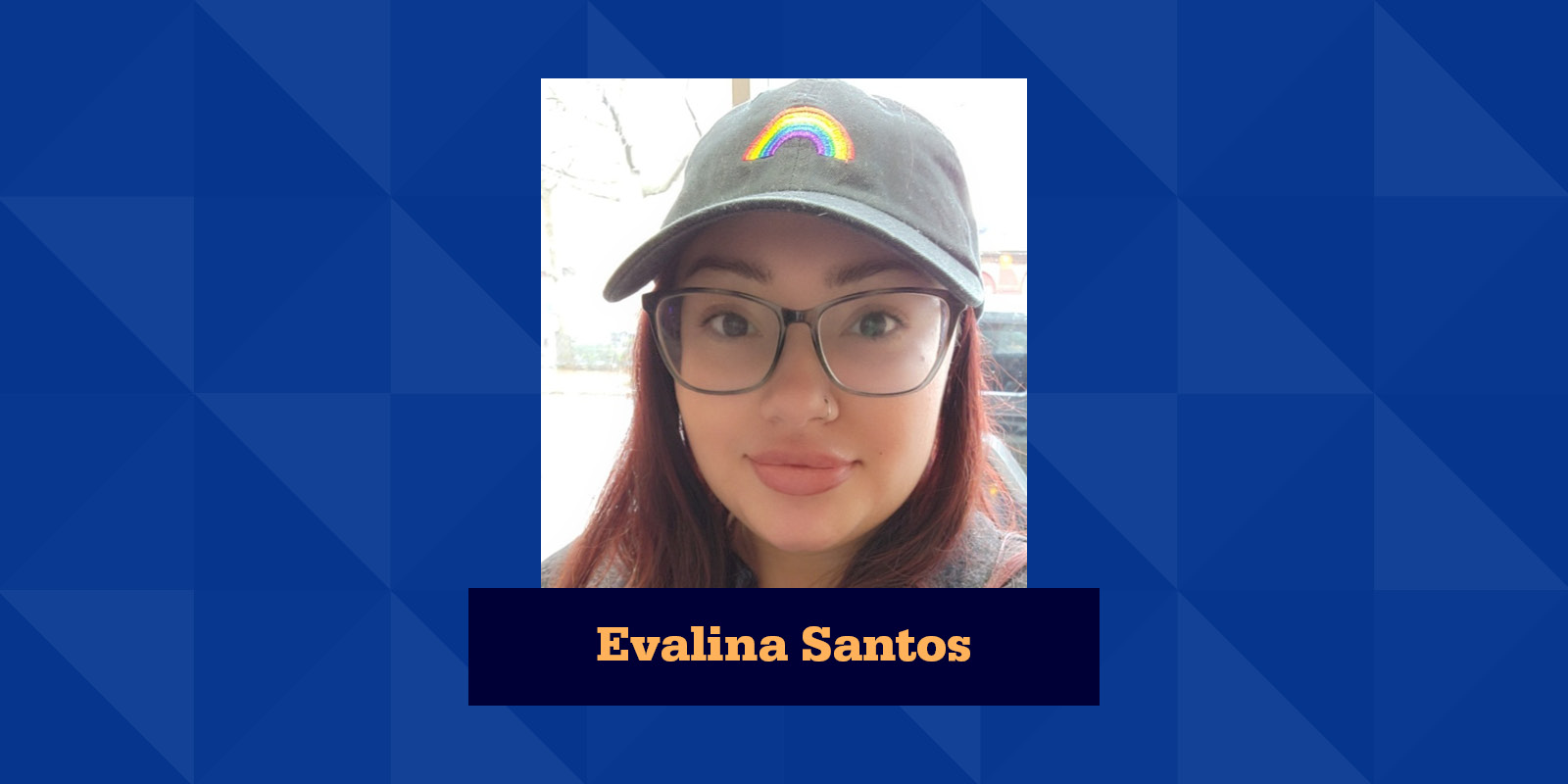
Evalina “Evey” Santos started her career at Pennsylvania Psychiatric Institute (PPI) as a front desk receptionist in 2020, moving on to the current position created just for her a year later. Evey is currently a Certified Tech and Resource Coordinator for the Dialectical Behavioral Therapy (DBT) program.
As a Resource Coordinator, she does the initial client intakes for the DBT program and skills classes, co-leading them as well. She also follows clients through their time at PPI, providing resources based on their needs to ensure they have the support they need while working on their goals and ensuring a successful discharge when the time comes. However, mental health was not always the field she thought she would end up working.
“It might be shocking to some, but I started out in mortuary school. But when we found out he was autistic, I knew I needed to be more consistent for my son. In looking for more fulfilling work, and wanting to better understand my son, I read up on autism. When I learned of the abuse and misconceptions that happened back in the ‘60s, it opened up the floodgates of wanting to be a social worker. Now, I’m enrolled in a program and doing an internship to get certified [for social work] – it’s really cool to be able to combine the two.”
Educating staff on LGBTQ+ support.
“When PPI leadership asks what we need more of, I always feel I can be honest and that my concerns are heard. I think the proof is all the trainings that the staff have access to, in particular the LGBTQ+ support that we have now,” explains Evey.
“We didn’t have all of this when I started three years ago. It’s branched out and it’s really a team effort. We work for the community and each of us has our own experiences and upbringings that make us essential. The most valuable thing that we can do is uplift and educate each other like staff and clients alike because I can learn just as much from our clients.”
“There was definitely no mention of [LGBTQ+ support] before. The subcommittee that I’m on for sexuality education that was formed two years ago is what started a lot of the change. We collaborated with Dr. Catherine Dalke, and she provided training on the ABCs of LGBTQ+, and it went over gender identity, gender expression, sexuality, the history and understanding of it.” After attending the training, those who understood her teachings and wanted to declare themselves a safe person received a rainbow pin.
“PPI also allows staff to attend trainings for further education and continuing education credits on the clock, once approved by a manager. We have had the most increase in trainings for LGBTQ+. For staff, the onboarding process from just three years ago had no mention of LGBTQ+ at all. Staff are trained in how to become a support system, how to handle certain situations and PPI offers safe space stickers to hang in front of your office if you’re interested.”
Better serving the LGBTQ+ population when they reach out for help.
Similarly, the intake process for clients has also improved. “When they first reach out for psychiatric help, first impression is everything. We have the SO/GI (Sexual Orientation and Gender Identity) form that is completed as part of the intake process. Even though I see someone’s name on their chart, I like to introduce myself first and ask them their name. Sometimes the name we have on file hasn’t been updated, and it’s better to ask them their preferred name and pronouns. We also have a section on the bottom of the form that says we will call them whatever name they put down, and if they are not out, they can let us know so when we make phone calls, we’ll refer to them by their given name.”
“Our office has safe space stuff everywhere. We have flags of every kind, even cultural things. And we’re not hiding anything. Luckily our staff is on board, and we’ll definitely apologize if a pronoun is misspoken.”
When LGBTQ+ clients come in, Evey notices there is often a fear of male therapists for transgender clients. “When they are set up with a male therapist, there is an automatic kind of fear that they’re going to be judged or rejected and we encourage them to stick through because we don’t want them to have a stigma against the male therapist also.”
“It’s really great to hear when they meet our male therapists and they’re like, ‘oh, it was actually nice.’ ‘I didn’t feel that way at all.’ And I think it’s really refreshing. We’ve never had a complaint that they wanted to change therapists.”
Taking a person-first approach.
Not just asking the questions to fill out the form, Evey looks at the person in front of her and gives them her full attention.
“My last intake was someone who was in their late 60s and recently came out. I asked them, ‘well, when did you know you were born in the wrong body?’ And they seemed so shocked that somebody would ask them something like that, but it also made them very comfortable. It gave them the chance to say, ‘I was five years old, and I love this, and I love that’.”
It isn’t only about gathering information for the intake. In between questions, Evey is already thinking of the resources that could be helpful.
“I want them to know that we’re going to be working together for the next 15 weeks, which is the length of the program. I want to get to know them and everything that we can do to support them. I ask their permission to look into support groups for them. A lot of these people never had a gender-affirming psychiatrist before, and it is really validating for them.”
Having BPD does not mean you’re confused about your orientation.
“The population I work with most of the time has borderline personality disorder (BPD). And they’re viewed as attention seeking and out of control and manipulative. When taking that formula and adding it with someone who’s part of LGBTQ+ community, the stigma is someone who is just confused. That’s the stigma and we can’t ignore it or else we won’t fix it. Sexuality/gender and personality disorders don’t always correlate.”
“We had a client who was really conflicted about their sexuality because they were raised in a very religious home, and they couldn’t see how they could identify as a lesbian and still hold the same religious values.”
“For someone who has BPD, we tell them: With the proper skills, you can ‘behavior your way out of that diagnosis’ because it’s not a chemical imbalance. And it started to become clear to me that the client felt that they could also ‘behavior their way out’ of their sexuality, which is not the case. And that’s how desperate people get when they fear they’re going to lose everything. They feel rejection and they feel shame for being part of two seemingly different lifestyles. But that’s the dialectic. You can believe in religion and be a spiritual person and be in love with someone as the same gender as you.”
“Sometimes telling them this is the only support these people have gotten in their lives.”
A pivotal experience and cautionary tale.
Evey had a moment in her career that was a pivotal experience in how she approaches care today.
“The experience that stands out to me – and it would probably be considered a little bit controversial – is about someone who transitioned surgically as a young adolescent. When they came to the DBT program, they were in their early 20s, they were female to male and were very conflicted about a lot of things. They went through a lot of trauma, sexual trauma and feelings of gender dysphoria at the time.”
“I think that we all need to find a way, as clinicians, to be supportive yet not pushy with ideals. Because by their account, they were not ready for the surgery and had a lot of regrets about it. They can’t have kids now. They had a full hysterectomy, and realized after there were other people living as a man that didn’t get an entire hysterectomy. They could have done that but weren’t educated on that option when they were younger and went with whatever the provider suggested.“
“The way they explained their feelings was that they didn’t think that they would get the right care or be viewed as a man unless they had everything done. And that’s what wound up happening, assuming they would be better. Today, they are still working through things. Gender is still a big issue for them. And there’s the regret that they wanted babies, which they can never have, at least not biologically.”
“The provider thought that it would be a cure for the depression they thought was only related to gender dysphoria, which wasn’t the case. I think the lesson for all of us is to find the line between being supportive and pushing for what we think they should be doing.”
“With people who are not educated fully or are vulnerable, to have a provider that you trust say ‘this is the best option for you’ only to regret it years later is really disheartening. And that doesn’t mean to not take someone seriously when they say that they want to transition. There are so many other ways to approach transitioning, without being too drastic, until they know for sure that they’re ready.”
Positive outcomes.
There are also stories of success, one Evey elaborates more on is the client previously mentioned who struggled with their religious beliefs and sexual orientation.
“They had a positive outcome. They’re a full-time educator and they have found community. Social media works wonders. They found groups that believe in the same God as they do, who also happen to be gay. And now, they’re okay with that and are coming to terms with the radical acceptance that some family members might not agree, but they understand that they have to live their life for themselves.”
“They are finally comfortable with the idea of dating a woman, which was a big deal because before that they thought they could never date them in fear of disappointing the church. They are actively on dating sites and getting to know people.”
A lasting impact.
“Dr. Dalke had a big impact on me because she wasn’t just a physician. She was supposed to be, but she wasn’t. She would have hour to an hour-and-a-half long sessions with clients at a time where gender-affirming therapists weren’t as common. It wasn’t about checking something off the list. It was literally like ‘how can I help you? I’m going to listen to you’. Clients don’t get that a lot. They knew they were being heard. It made me change my idea on some things.”
“From that, going into my current role, I knew I needed to do more listening. It’s not me trying to diagnose or figure out how to problem solve a situation, it’s more about listening. I’ll offer resources, but I’ll never push them.”
If you’d like to learn more about the PPI’s approach to LGBTQ+ mental health, please don’t hesitate to contact us by phone, 866-746-2496 or through our website. We’re committed to providing an inclusive, welcoming space where everyone can access the care and support they need.

